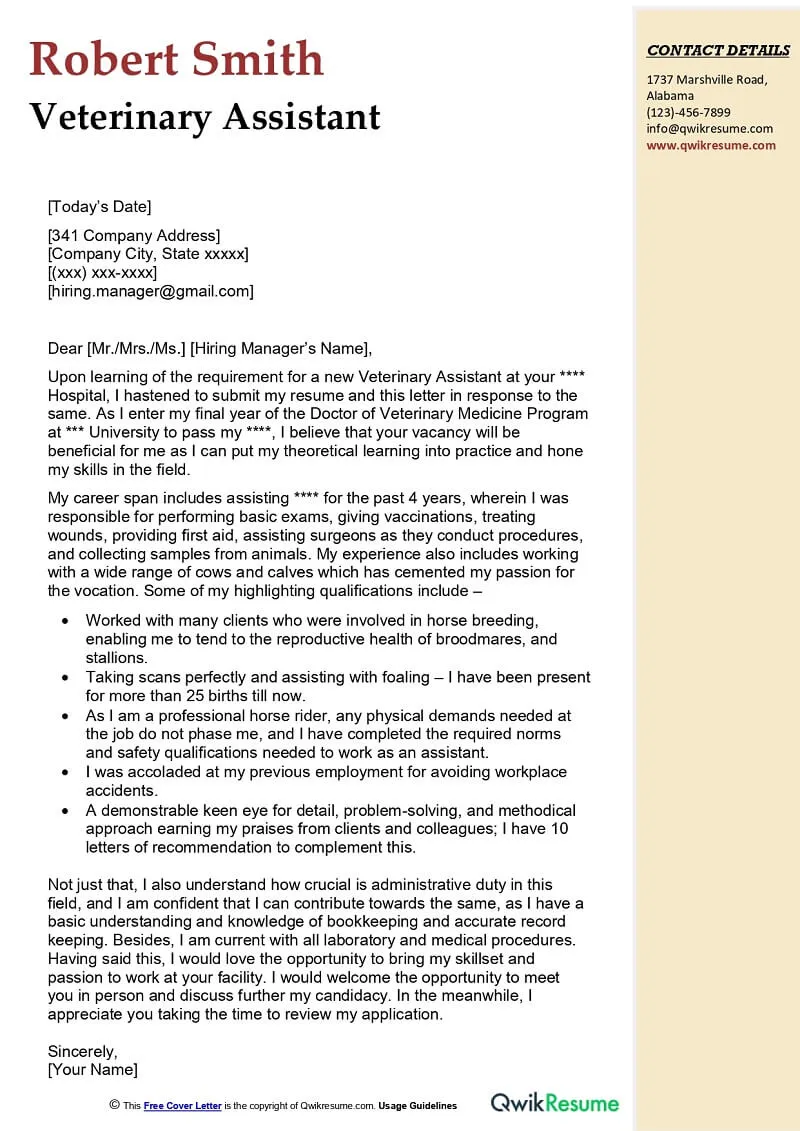Why a Nursing Assistant Cover Letter is Crucial
A cover letter is your first chance to make a positive impression on a potential employer. For a nursing assistant job, it’s not just a formality; it’s a critical document that can significantly impact your chances of getting an interview. Unlike a resume, which lists your qualifications, a cover letter allows you to showcase your personality, passion, and suitability for the role. It provides context to your experiences, highlighting how your skills and values align with the employer’s needs and the facility’s culture. In a competitive job market, a well-crafted cover letter can be the deciding factor between you and other qualified candidates. Think of it as your personal introduction, setting the stage for the narrative of your career aspirations and demonstrating why you’re the ideal candidate. Furthermore, a cover letter allows you to address specific requirements mentioned in the job posting and explain any gaps or unique circumstances in your background, offering a complete picture of you as a candidate.
Highlighting Your Skills and Qualifications
When writing your cover letter, focus on highlighting the skills and qualifications that make you a strong nursing assistant candidate. Review the job description carefully and identify the key requirements the employer is seeking. Then, tailor your letter to demonstrate how your skills and experience align with these needs. This requires more than just listing your abilities; it involves providing specific examples and demonstrating how you have applied these skills in real-world scenarios. Emphasize the abilities most relevant to patient care, such as communication, empathy, and the ability to work effectively within a team. Also, if you possess any special certifications, training, or knowledge that aligns with the job requirements, make sure to mention them. The goal is to present a clear and compelling case for why you are the right fit for the nursing assistant position, showcasing how your skills and qualifications will allow you to excel in the role and contribute positively to the healthcare facility.
Clinical Skills
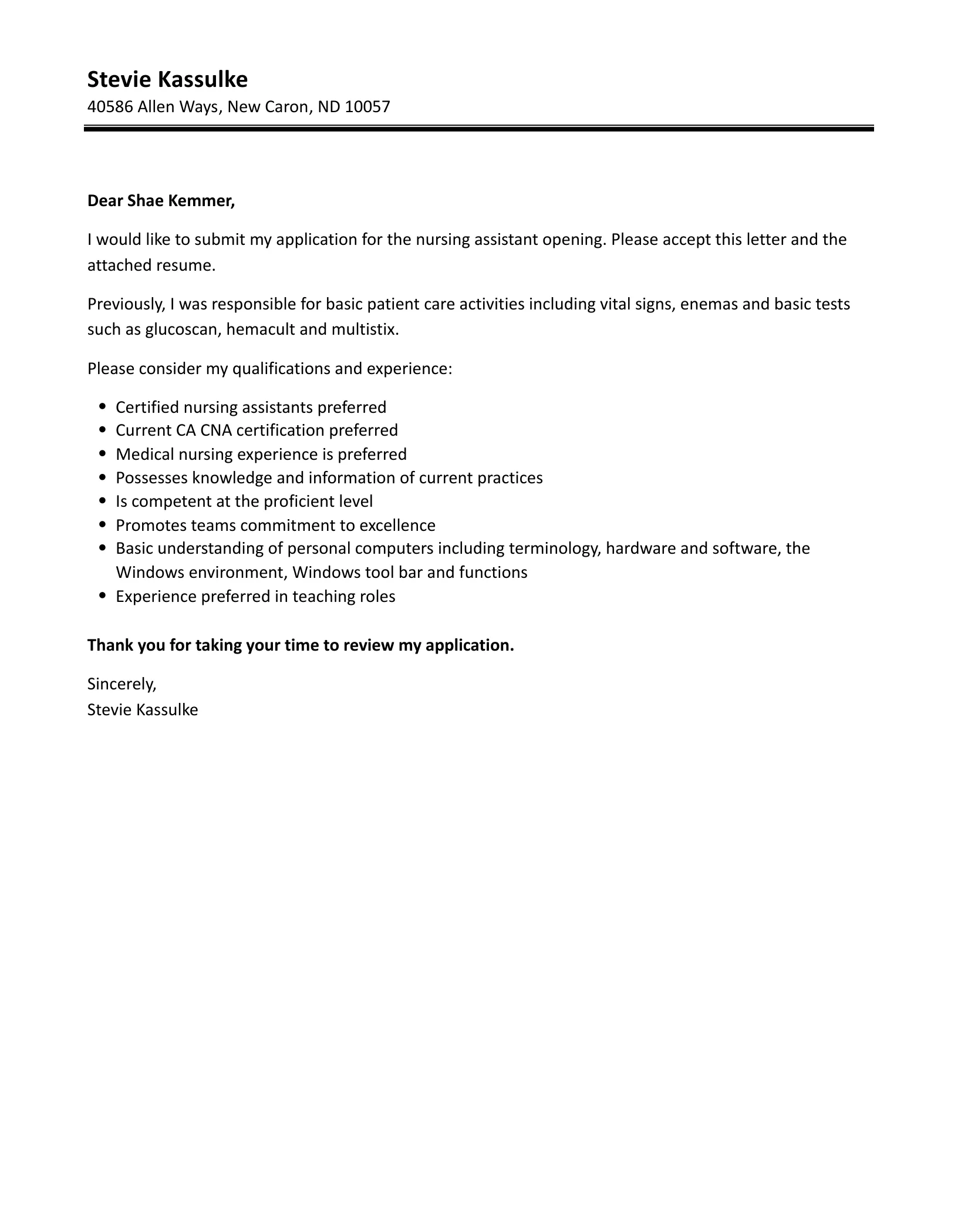
Nursing assistants require a diverse set of clinical skills to provide effective patient care. When composing your cover letter, it’s essential to emphasize your competencies in areas such as taking vital signs (blood pressure, temperature, pulse, respiration), assisting with activities of daily living (ADLs), and recognizing and reporting changes in patient conditions. Include your skills in assisting patients with mobility, transferring them safely, and administering basic first aid. If you have experience with specific medical equipment like oxygen tanks or feeding tubes, be sure to mention it. In addition, highlight your proficiency in maintaining patient hygiene, including bathing, dressing, and toileting, demonstrating a keen understanding of infection control. Remember to provide specific examples of how you’ve utilized these clinical skills in previous roles to showcase your abilities effectively.
Communication and Interpersonal Skills
Excellent communication and interpersonal skills are vital for nursing assistants to interact effectively with patients, families, and healthcare teams. Showcase your abilities to communicate clearly, empathetically, and respectfully. Mention your experience in active listening, understanding patient concerns, and conveying information in a way that patients can comprehend. Highlight your ability to work collaboratively with nurses, doctors, and other healthcare staff to ensure seamless patient care. Providing examples of your skills in managing difficult conversations or resolving conflicts can be particularly impressive. Highlight your ability to create a supportive environment and maintain professionalism while building rapport with patients and their families, as this demonstrates your interpersonal abilities. Emphasizing these soft skills will help you stand out as a well-rounded candidate with excellent communication and collaboration capabilities.
Empathy and Compassion
Nursing assistants are expected to show empathy and compassion. These qualities are vital to establish a caring environment. Demonstrate your ability to recognize and understand patient’s emotional needs. Share instances when you went above and beyond to provide comfort and support, creating a feeling of safety. Mention your experience assisting patients through difficult moments, offering reassurance, and providing a caring presence. Highlighting your empathy and compassion is not only crucial for the job but also shows that you care about your work, which helps you stand out. When highlighting such skills, use impactful anecdotes and details that will make you appear personable and make a strong impression on the hiring manager. This adds a vital human touch to your application, making you more personable and helping the reader appreciate your commitment to patient well-being.
Showcasing Relevant Experience
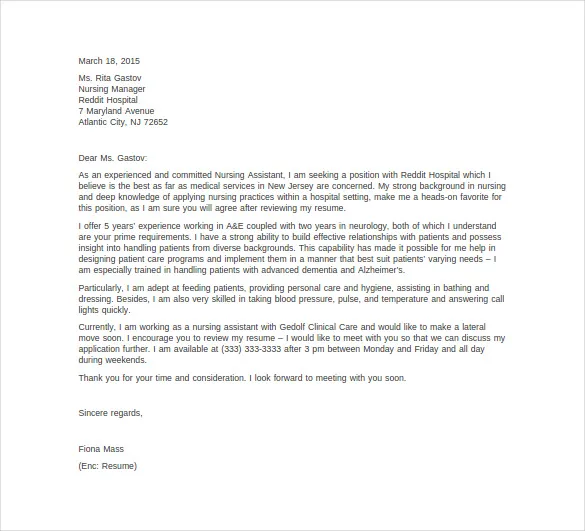
To impress employers, your cover letter must present your experience. Include specific examples of your past work to prove your capabilities. Focus on experiences that are similar to the job description. For example, if the job involves assisting patients with daily tasks, share times when you have done that. If you have additional training, certifications, or special abilities, make sure you include them as well. If your experience is limited, focus on transferable skills learned in different settings, like volunteer work or other jobs where you worked with people. Explain how the work has made you successful in the job you are applying for. When describing your experiences, use strong action verbs and quantitative data to show the impact of your work. This part of the cover letter is a great way to set you apart from other candidates by demonstrating your practical and applicable skills.
Previous Healthcare Experience
If you have worked in the healthcare field, include the name of the facility, your role, and the time you were employed. Summarize your responsibilities, highlighting any specific achievements or contributions. Emphasize any experience working directly with patients, such as assisting with daily activities, monitoring vital signs, or providing personal care. Mention any specialized training or certifications you have obtained. Highlight any accomplishments or positive feedback you received from supervisors or patients. Use strong action verbs and provide specific examples. For example, instead of writing ‘assisted patients,’ you might write ‘assisted an average of 15 patients daily with mobility and personal hygiene, resulting in improved patient comfort and satisfaction.’ Including precise details and measurable results will demonstrate your abilities. If you have worked in a variety of healthcare settings, such as hospitals, nursing homes, or home health care, it demonstrates adaptability.
Volunteer Work and Shadowing
If you have limited professional experience, use your cover letter to highlight volunteer work, shadowing experiences, or any other relevant activities. Describe your roles and responsibilities, emphasizing how they have prepared you for a nursing assistant position. Focus on the skills and experiences you gained, such as patient care, communication, or teamwork. For example, you could write, ‘During my time volunteering at a local hospice, I assisted with patient care tasks, provided emotional support to patients and their families, and collaborated with nurses to ensure patient well-being.’ If you have shadowed a healthcare professional, mention your observations and how you learned about the role. Focus on your eagerness to gain practical experience. When you lack direct experience, volunteer work and shadowing can be particularly valuable in demonstrating your commitment to healthcare.
Tailoring Your Cover Letter
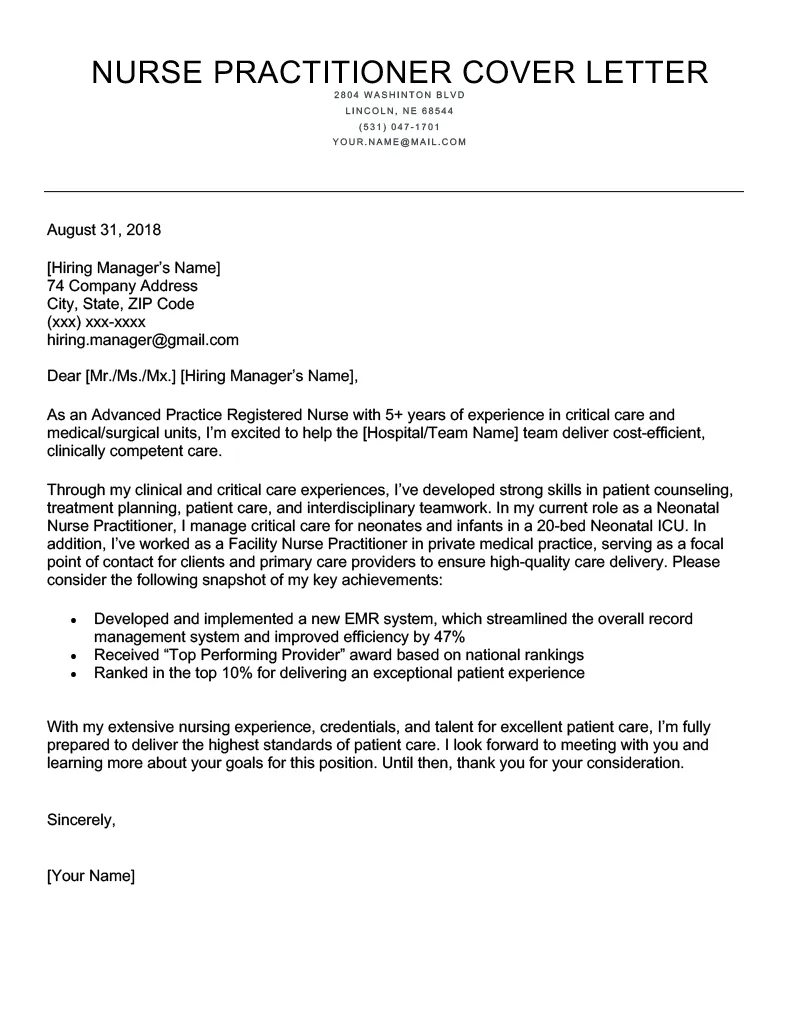
Customizing your cover letter for each job application is key to making a strong impression. Generic cover letters are easily identified and often discarded. To make your letter stand out, carefully review the job description and highlight your relevant skills. Include a brief overview of the facility’s mission and values, demonstrating your research and your understanding of their needs. This shows your interest in working for that specific organization. Include skills or qualifications mentioned in the job description, and show how you meet the needs. Use the same keywords and phrases from the job description to clearly match your qualifications. A personalized approach, as opposed to using a template, shows that you are serious about the job and have taken the time to consider how you fit into the organization. This significantly increases your chances of being noticed by the hiring manager.
Researching the Facility
Before writing your cover letter, take the time to research the healthcare facility where you are applying. Visit their website, read reviews, and consider their mission, values, and the services they provide. This research will allow you to address your cover letter to the hiring manager and helps to demonstrate your interest in the role and the organization. Tailor your letter to reflect the facility’s focus and needs. Incorporate details about the facility that resonate with your values, such as a commitment to patient-centered care or a particular approach to healthcare. By showing that you have researched the facility, you demonstrate your genuine interest in joining their team. Including details such as the facility’s philosophy of care or community involvement can make your cover letter stand out. Research also helps you understand the facility’s culture, which can help you highlight your personality traits and skills.
Matching Skills to Requirements
The job description should be the foundation of your cover letter. Carefully review the job posting and identify the skills, qualifications, and experiences the employer is seeking. For example, if the posting mentions ’excellent communication skills,’ make sure to highlight your communication abilities. Provide specific examples of how you have demonstrated these skills. If the posting requires experience with a particular medical procedure or equipment, mention your familiarity with those items. Use the same keywords and phrases from the job description to indicate that you meet their requirements. Make sure your skills match the needs. If the job description emphasizes teamwork, describe your ability to work collaboratively. Your cover letter becomes more convincing and engaging when you tailor it to the specific needs of the employer.
Writing a Strong Opening
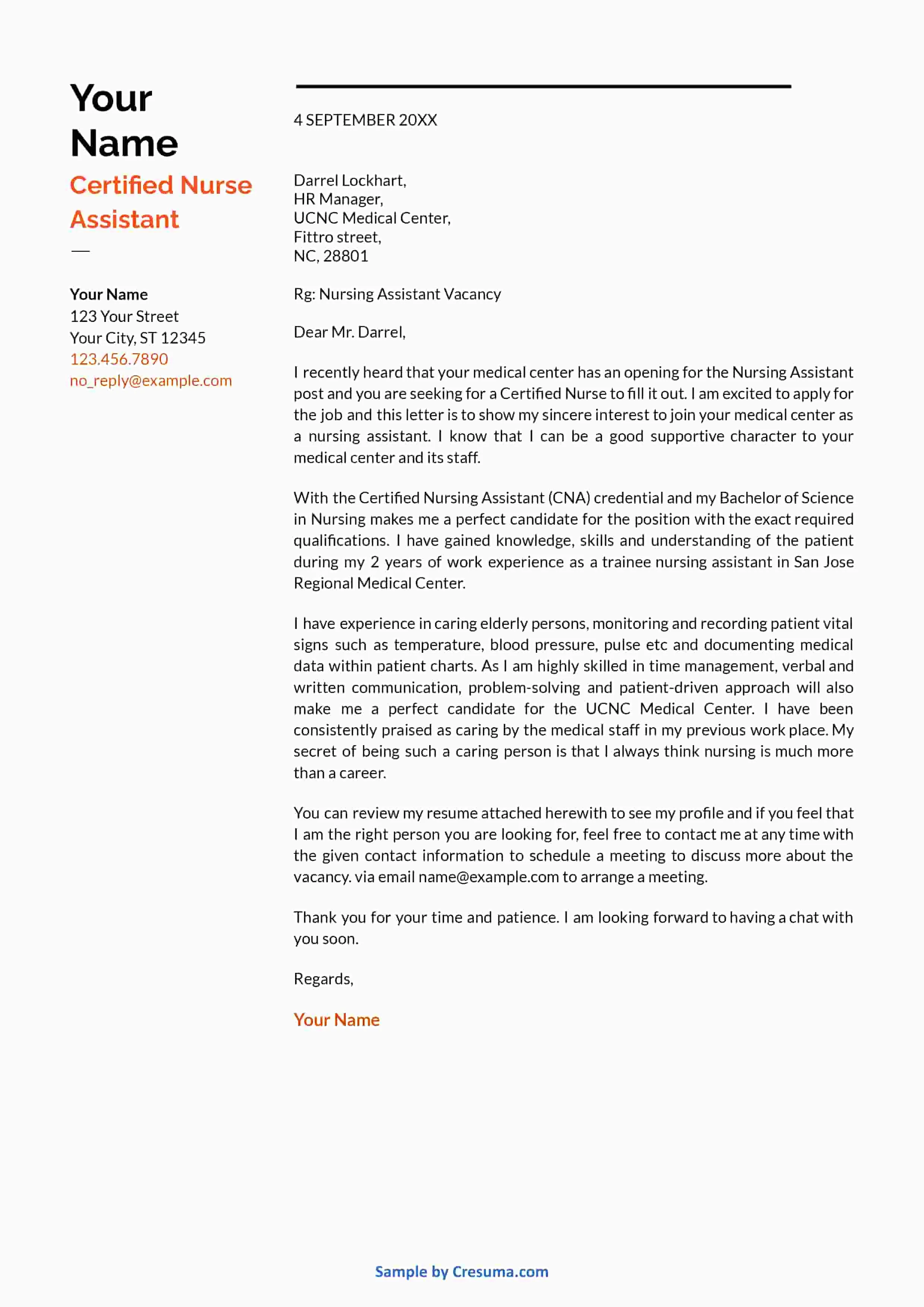
The opening paragraph of your cover letter is critical as it sets the tone and grabs the reader’s attention. Begin by stating your purpose—that is, the position you’re applying for—and how you learned about the job. Consider mentioning the facility’s name, which shows that you are customizing the letter. Make your introduction concise and enthusiastic to immediately capture the reader’s interest. Express your enthusiasm for the position and for the facility. Avoid generic phrases, such as ‘I am writing to express my interest.’ Use strong action verbs and highlight your key qualifications or skills right away. Your opening paragraph is your opportunity to make a strong first impression. By stating your purpose, showing your enthusiasm, and highlighting your key skills, you are more likely to persuade the reader to keep reading. This is crucial as it immediately grabs the reader’s attention and encourages them to review the full content.
Expressing Enthusiasm
Expressing enthusiasm is crucial in your cover letter, as it helps you to convey your excitement for the position. When you express genuine enthusiasm, it makes your letter more engaging and memorable. Show your excitement for the role, for working at the facility, and for the opportunity to make a difference. Include specific reasons for your interest, such as aligning your values with the facility’s mission. Explain what makes you excited about the work, whether it’s the chance to help others, to learn new skills, or to work within a particular environment. Use language that reflects positivity and engagement. Including strong language, such as ‘I am eager to contribute,’ and ‘I am excited about the opportunity,’ helps to convey your passion. Expressing your enthusiasm will make your letter stand out, and it shows the reader that you are truly interested in the job, which will create a positive first impression.
Clearly Stating Your Intent
Make sure your cover letter clearly states your intent and the position you are applying for. State the specific job title in the opening paragraph, ensuring that the employer knows what position you are seeking. This helps to eliminate any confusion and allows the hiring manager to see if your application matches the available roles. By specifying your intent, you save the hiring manager time and immediately demonstrate your serious interest in a particular position. To enhance clarity, briefly mention where you saw the job posting and any details that make you qualified for the role. Your goal is to present a clear message that will encourage the reader to quickly recognize your interest. When your intentions are clear, your cover letter becomes more effective, and it makes it easier for employers to assess your application.
Crafting the Body of Your Letter
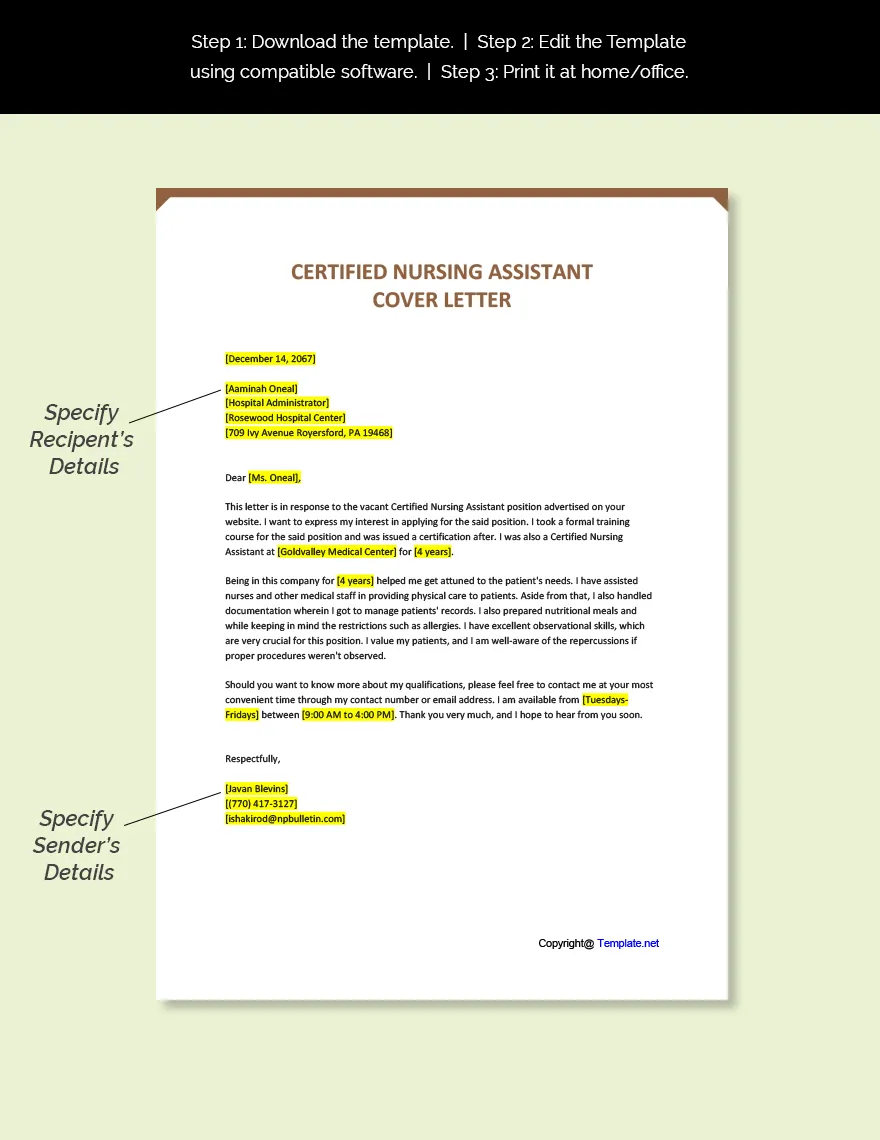
The body of your cover letter is where you elaborate on your skills and experience. To write a strong body, emphasize the key requirements mentioned in the job description and align your skills with those requirements. Provide specific examples that showcase your abilities in areas such as patient care, communication, and teamwork. Use the STAR method (Situation, Task, Action, Result) to structure your examples. Include the situation you encountered, the task you were given, the actions you took, and the results you achieved. This method allows you to provide context and quantify your achievements. Remember to use clear and concise language. Avoid unnecessary jargon, and focus on conveying your skills. Keep the body of your cover letter engaging and easy to read. This organization will help you showcase how you have successfully utilized your skills. It will demonstrate your capacity to excel in the role and contribute to the facility’s care practices.
Detailing Accomplishments and Achievements
Focus on your accomplishments and achievements to show the employer what you have achieved. Instead of just stating your duties, provide examples of your successes in previous roles. Quantify your achievements. For example, if you reduced patient falls, state the percentage decrease. Instead of saying, ‘assisted patients,’ write, ‘assisted an average of 20 patients daily with activities of daily living, resulting in increased patient comfort and satisfaction.’ Show what your achievements were, such as helping improve patient outcomes, streamlining procedures, or receiving positive feedback. By highlighting your achievements, you provide evidence that you are a high-performing candidate. Provide examples that reflect your commitment to providing excellent patient care and achieving positive outcomes. Highlighting your achievements is far more effective than just listing your duties. It shows what makes you a qualified candidate.
Providing Specific Examples
When explaining your skills and qualifications, provide specific examples to demonstrate your capabilities. Generalized statements often leave the hiring manager to make assumptions. Provide details that reflect what you have done. Use real-life scenarios, and explain the situation you faced, the actions you took, and the results you achieved. Use the STAR method to create strong examples. This will help you show your ability to handle different situations. If the job description requires patient communication skills, provide specific examples. For instance, write ‘During my previous role, I communicated effectively with patients by explaining medical information in a clear, easily understandable way. This led to a 20% increase in patient satisfaction scores as measured by post-visit surveys.’ Specific examples show how you can apply your skills. Your cover letter becomes more impactful, and you will have a higher chance of getting hired when you include details that illustrate your ability to perform the job.
Quantifying Your Impact
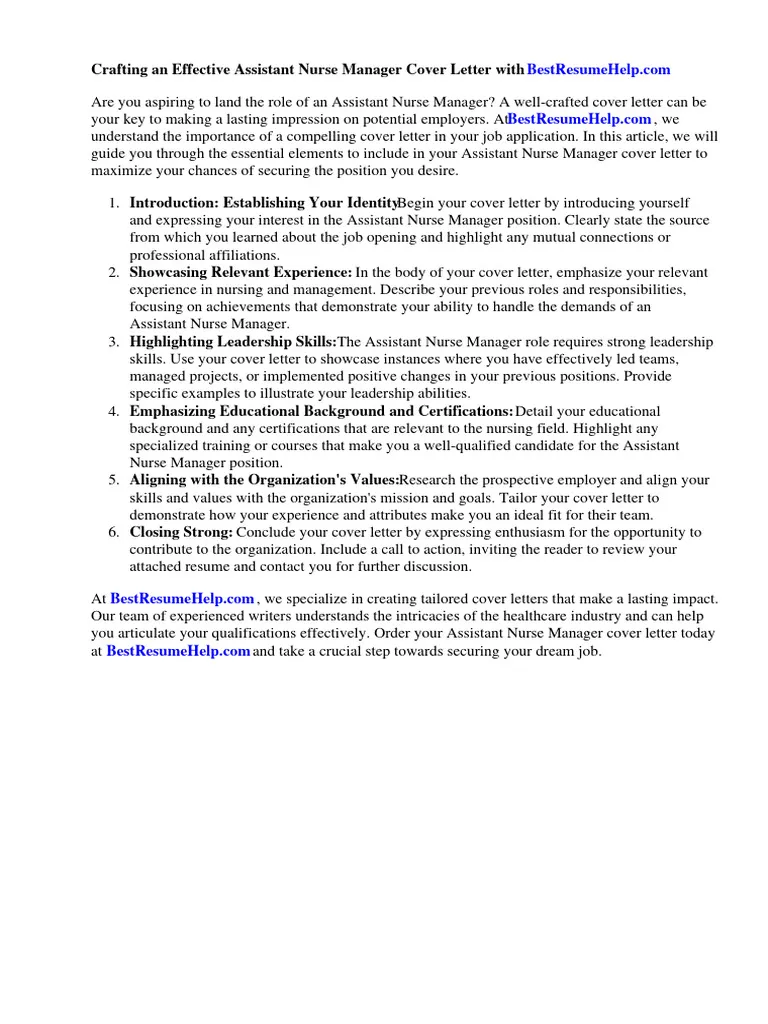
Quantify your accomplishments whenever possible to demonstrate the impact you have made. Instead of writing ‘improved patient care,’ write ‘improved patient care by 15%.’ By using numbers, you provide tangible evidence of your abilities. Quantifying your results adds credibility to your claims and helps hiring managers to understand the scope and impact of your work. Show the value you can bring to the facility. If you increased efficiency or reduced costs, include the percentage. Quantifying your accomplishments is an effective way to show the value of your skills. It allows the hiring manager to measure your impact.
Closing Your Cover Letter Effectively
The closing paragraph of your cover letter is your last opportunity to make a strong impression. Summarize your interest in the position and reiterate your enthusiasm for the opportunity. Thank the employer for their consideration. End your cover letter with a clear call to action, like inviting the employer to contact you. Make sure the closing paragraph is professional and leaves a lasting impression. A well-crafted closing paragraph reiterates your interest. This demonstrates your professionalism and commitment to the role. A well-crafted closing paragraph can increase your chances of securing an interview.
Reiterating Interest and Availability
Reiterate your interest in the position and highlight your enthusiasm for the opportunity. Reiterate your qualifications, showing again that you meet the employer’s requirements. Reiterate your commitment to the role and the facility. Make sure you are available for an interview and are ready to provide any further information. Be enthusiastic and summarize why you would be a good match for the role. By reaffirming your interest, you leave a positive impression. Doing so shows that you are serious about the job. It reminds the employer of your qualifications. Including a statement of your availability makes it easier for them to proceed with the hiring process.
Including a Call to Action
To conclude your cover letter, add a clear call to action. Invite the employer to contact you for an interview or to discuss your qualifications further. Provide your contact information, including your phone number and email address. Mention your availability for an interview or any follow-up. Making it easy for the employer to contact you increases your chances of getting a response. A call to action shows your eagerness. It allows the employer to take the next step and move forward with the hiring process. A well-executed call to action improves your application.
Formatting and Proofreading
Proper formatting and proofreading are essential for your cover letter to be successful. Poorly formatted or poorly written letters can give a bad first impression and lead to your application being rejected. Take your time when formatting your cover letter. Make sure to use the correct font, spacing, and layout. Proofread your letter carefully to avoid errors. Consider the overall appearance of the document. A well-formatted, error-free cover letter shows your attention to detail and professionalism. By using proper formatting and proofreading your cover letter, you increase your chances of getting an interview and securing a job.
Formatting Guidelines
Follow professional formatting guidelines for your cover letter. Use a standard, readable font like Times New Roman or Arial, and use a font size between 10 and 12 points. Use single spacing within paragraphs and double spacing between paragraphs. Include your contact information in the header. Include the date. Address the letter to the hiring manager by name whenever possible. Use a professional tone, and keep the letter concise. Your cover letter should be one page. By following these guidelines, you can create a well-formatted letter that is easy to read. Adhering to these formatting standards will make it easy for the hiring manager to read and ensure that it reflects your professionalism.
Proofreading for Errors
Proofread your cover letter carefully to ensure there are no errors. Errors in grammar, spelling, and punctuation can damage your credibility. Read the letter multiple times. Ask a friend to proofread your letter. Pay close attention to detail. Use spell check and grammar check tools. Make sure your letter is clear, concise, and easy to read. A proofread cover letter shows your professionalism and attention to detail. Avoiding errors shows your professionalism and attention to detail and increases your chances of being hired. Carefully proofreading your cover letter will ensure that it presents a positive impression.
Best Cover Letter Examples for Nursing Assistant
To prepare your cover letter, review examples that show best practices. These examples will help you understand how to present your skills. Look for examples that highlight the applicant’s enthusiasm for the role. Assess the structure of the letter, including how the applicant opens, presents their skills, and closes the letter. Adapt the examples to match your skills and experience. Make sure that the examples have a strong, personalized opening. Use examples that emphasize accomplishments and achievements. Studying these examples can help you learn how to structure and write your cover letter. This will make your letter more effective, and you will increase your chances of getting hired.
Highlighting Your Personality
Your cover letter provides an opportunity to let your personality show through. When writing your letter, be genuine. Show your passion for nursing care, and communicate your values and your work ethic. Use a professional but authentic tone, and let your unique traits shine. Including your personality can show the hiring manager that you are the best fit. In a field that relies on relationships, showing your personality makes you more human. Your letter becomes more engaging when your personality is shown, and it helps you connect with the reader.
